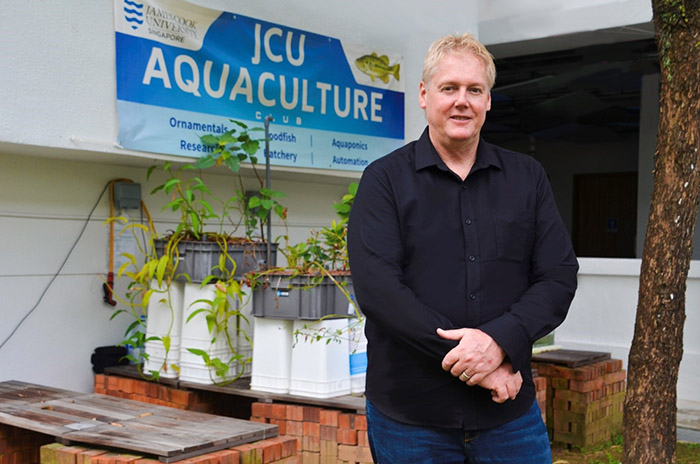Media Releases
Dr Clive Jones’s rock lobster farming research may provide relief from poverty
Media Releases
With almost four decades of professional experience, Dr Clive Jones is developing aquaculture opportunities in the Tropics.

(Pictured: Dr Clive Jones – Associate Professor in Aquaculture at the Tropical Futures Institute, James Cook University in Singapore)
Having lived in Australia by the sea as a child, Dr Clive Jones – Associate Professor in Aquaculture at the Tropical Futures Institute, James Cook University in Singapore – has always had an interest in the sea and aquatic life.
His research, focussing on marine rock lobster (also known as spiny lobster or sea crayfish) and freshwater crayfish aquaculture, seeks to develop aquaculture opportunities – such as rock lobster farming – in the Tropics.
Associate Professor Jones said, “The beauty of rock lobster aquaculture is that it’s such a high-value product, and yet it’s relatively simple to grow.” As a matter of fact, rock lobsters are seen as prized seafood and are the biggest food export of the Bahamas, while the rock lobster fishery is the largest commercial fishery in Florida1.
He added, “Lobsters have turned out to be a really wonderful opportunity for a lot of poor countries and poor communities along the coastline, where fishing maybe is in trouble because of overfishing or destructive fishing practices.”

(Associate Professor Clive Jones with local Indonesian fisherfolk)
Associate Professor Jones shares his expertise with countries in Southeast Asia – including Indonesia, Vietnam, and the Philippines. His efforts have seen him interact with both senior people at the government level as well as the everyday fisherman. In fact, Associate Professor Jones said that his favourite part of the job is “being out in the field and working directly with the people that [he’s] benefitting.”
That said, the research is not without its challenges. One of the biggest challenges is the hatchery production of baby rock lobsters. This hatchery research is one that Associate Professor Jones has worked on for approximately 10 years. Ultimately, he determined that the technology was incredibly difficult, and simply wasn’t commercially viable.
Instead, through field research, he discovered that rock lobsters produce huge numbers of offspring, in hotspots throughout Southeast Asia, to ensure a sustainable population in the face of their naturally high mortality rate. More than 99 per cent of these baby lobsters die from being eaten by fish or from their inability to find a suitable habitat. As such, collecting these baby lobsters before they die allows them to be used for aquaculture without impacting their adult population.
While his work often sees him working on the international stage, Associate Professor Jones is also hard at work on projects in Singapore, including lending his knowledge in aquaculture to help a sustainable design solutions company develop urban gardens.
Indeed, James Cook University strongly believes in using the power of knowledge to change lives, and creating a brighter future for life in the Tropics. Associate Professor Jones’s work and research is emblematic of this philosophy.
Check out Associate Professor Clive Jones’s staff and research profiles here.
For further information on areas of research strength in Aquaculture and future collaborative opportunities at James Cook University in Singapore, click here.
1 Inland Seafood Inc., 2020. LOBSTER: SPINY (ROCK LOBSTER). https://www.inlandseafood.com/seapedia/lobster-spiny-rock-lobster
Contacts
Associate Professor Clive Jones clive.jones@jcu.edu.au
Media: Pinky Sibal pinky.sibal@jcu.edu.au